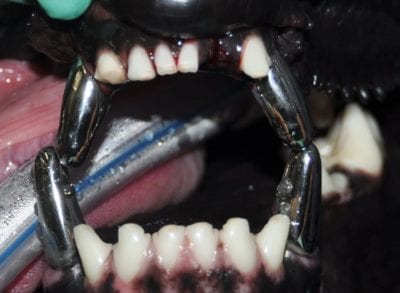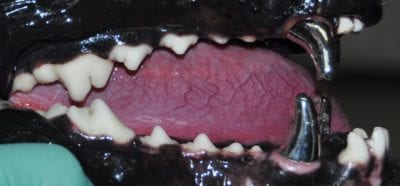Endodontics
Endodontics is the study, diagnosis, and treatment of the diseases and injuries to the pulp. This ‘endodontic system’ is the hollow area inside the tooth containing blood vessels, nerves, and connective tissue. These make up the pulp tissue, which sustains the tooth through growth, maturity, and response to stress. The dental specialists at Dallas Veterinary Dentistry & Oral Surgery are skilled in endodontics and providing advanced treatments to preserve teeth after they have become damaged or abscessed. Call us today at (817) 431-8451.
Endodontic Disease
Endodontic disease occurs when a tooth’s pulp is damaged. Also known as pulpitis, this condition can either be reversible or irreversible, depending on its severity. Minor pulpitis occurs when the pulp tissue swells and prevents the blood supply from entering the root canal and nourishing the tooth. Severe pulpitis may occur in a fractured tooth, which exposes the pulp to bacteria in the mouth. Once bacteria have entered the root canal, neither the immune system nor antibiotics can remove it.
Fractured and infected teeth are painful. While dogs and cats will naturally hide their discomfort, this does not mean that they’re not in pain. Difficulty eating, decreased activity, heavy drooling, and swelling around the face can all indicate a painful dental issue.
How We Use Endodontics to Treat Our Patients
Before we can select a treatment option that best serves your pet, we will need to take radiographs to see the extent of the damage to the tooth and surrounding bone. Also, we need to check if the root is still intact. Once your pet has been evaluated, we can suggest an appropriate treatment.
Root Canal Therapy
Root canal therapy involves removing diseased pulpal tissue from the tooth, cleaning and disinfecting the root canal, then filling the root canal with an inert material to prevent future bacterial infections. For additional protection, we place restorations to keep the crown safely sealed. Following this procedure, we take another radiograph to make sure the root canal has been filled properly.
Titanium metal crowns can also be fabricated and placed on teeth to protect them. This can be very beneficial for working and protection dogs, as well as, dogs that are vigorous chewers.


Vital Pulp Therapy
The goal of vital pulp therapy is to preserve pulp tissue that has been affected but not destroyed by bacteria in order to preserve the tooth itself. This treatment does not guarantee that a tooth will be saved but it may prove beneficial in patients under 18 months of age that recently sustained tooth fractures.
Surgical Extraction
If the tooth cannot be saved, surgical extraction may be the best option. Fractured and/or infected teeth are very painful to live with and can have a serious impact on your pet’s quality of life. Dogs and cats both adapt very well to extractions and can, with time, return to normal eating habits. Call us at (817) 431-8451.
Seek Treatment for Your Pet
If your pet has a broken tooth, they need to be seen by a veterinary dental specialist as soon as possible, even if your pet doesn't appear to be painful. We all know that dogs and cats are good at hiding pain. In addition to the pain, your pet could also be vulnerable to an infection. Contact us at (817) 431-8451 if you would like to know more about endodontics and to consult with a veterinary dental specialist.




